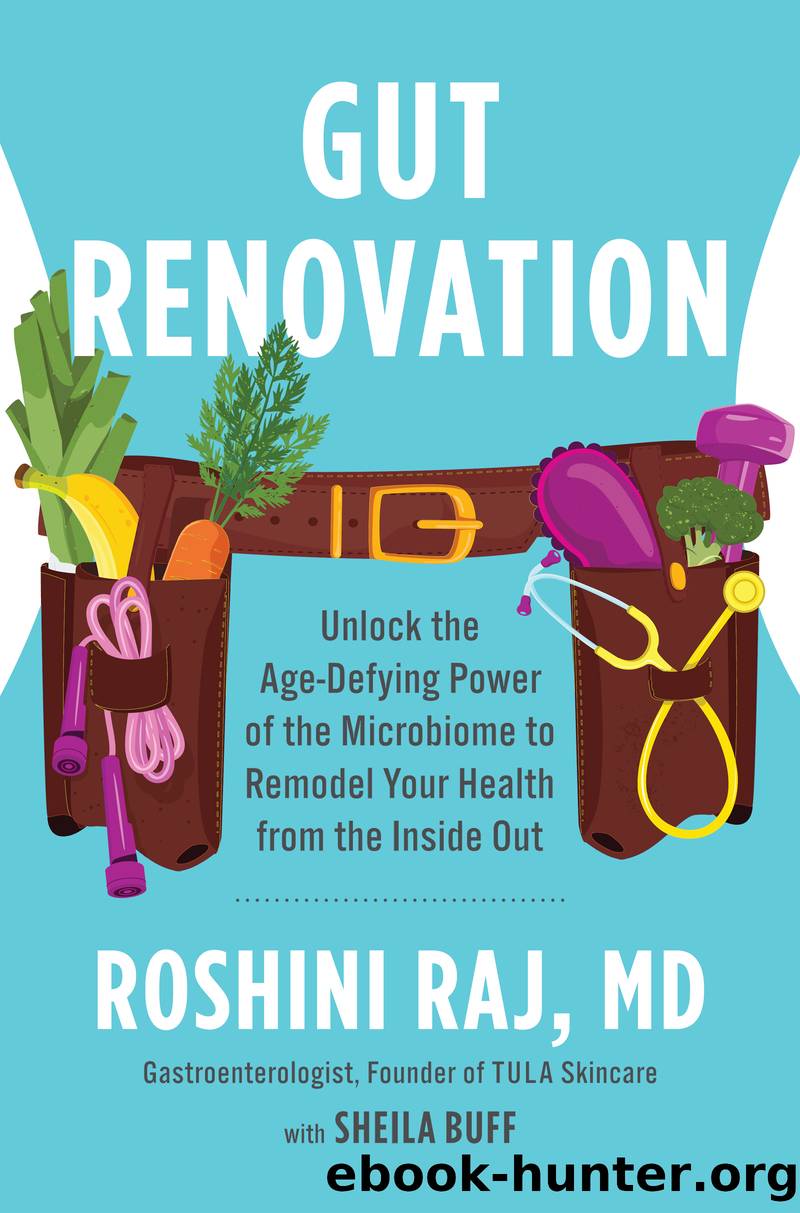Gut Renovation by Dr. Roshini Raj

Author:Dr. Roshini Raj
Language: eng
Format: epub
Publisher: HarperCollins
Published: 2022-01-28T00:00:00+00:00
Why You Sleep
Sleep is just as essential to your health as food and water. In fact, your body does a mini-renovation every night when you sleep. You may be snoozing, but your body is very busy as it repairs or removes damaged cells, releases hormones for growth and repair (and also hormones related to hunger and appetite) and builds up energy levels for when youâre awake. In your brain, sleep helps you make long-term memories and process and store new information. Sleep is also key for efficient executive function when youâre awake: you need to be well rested to focus, solve problems, concentrate, make decisions, and regulate your emotions.
Your sleepâwake cycle is governed by two internal biological clocks: your circadian rhythm and your sleepâwake homeostasis. Your circadian rhythms are physical and mental processes that follow a twenty-four-hour cycle responding to light and dark. Sleep homeostasis is the drive to sleep, based on how long youâve been awake. Over the course of roughly twenty-four hours, these two internal biological clocks interact and tell your body when to sleep and when to be awakeâand also control other functions, including body temperature, hormone release, and your metabolism. Sleepâwake homeostasis works in sync with your circadian clock to track how long youâve been awake and to tell you itâs time for bed. The homeostatic sleep drive builds up and gets stronger every hour youâre awake, until you finally give in and go to bed. Both internal clocks respond to environmental cues, especially light, to make you wake up naturally in the morning. They also both contribute to the natural ebb and flow of your alertness over the course of the day.
Most people have a sleepâwake cycle that syncs nicely with the twenty-four-hour dayânight cycle. However, lots of factors can mess up your sleepâwake cycle, including stress, shift work, jet lag, illness, pain, some medications, your sleep environment (a snoring partner, for example), and what you eat and drink in the hours before you go to sleep.
Download
This site does not store any files on its server. We only index and link to content provided by other sites. Please contact the content providers to delete copyright contents if any and email us, we'll remove relevant links or contents immediately.
Periodization Training for Sports by Tudor Bompa(8250)
Why We Sleep: Unlocking the Power of Sleep and Dreams by Matthew Walker(6694)
Paper Towns by Green John(5175)
The Immortal Life of Henrietta Lacks by Rebecca Skloot(4571)
The Sports Rules Book by Human Kinetics(4377)
Dynamic Alignment Through Imagery by Eric Franklin(4205)
ACSM's Complete Guide to Fitness & Health by ACSM(4049)
Kaplan MCAT Organic Chemistry Review: Created for MCAT 2015 (Kaplan Test Prep) by Kaplan(3998)
Introduction to Kinesiology by Shirl J. Hoffman(3764)
Livewired by David Eagleman(3762)
The Death of the Heart by Elizabeth Bowen(3602)
The River of Consciousness by Oliver Sacks(3598)
Alchemy and Alchemists by C. J. S. Thompson(3509)
Bad Pharma by Ben Goldacre(3420)
Descartes' Error by Antonio Damasio(3270)
The Emperor of All Maladies: A Biography of Cancer by Siddhartha Mukherjee(3140)
The Gene: An Intimate History by Siddhartha Mukherjee(3091)
The Fate of Rome: Climate, Disease, and the End of an Empire (The Princeton History of the Ancient World) by Kyle Harper(3055)
Kaplan MCAT Behavioral Sciences Review: Created for MCAT 2015 (Kaplan Test Prep) by Kaplan(2979)
